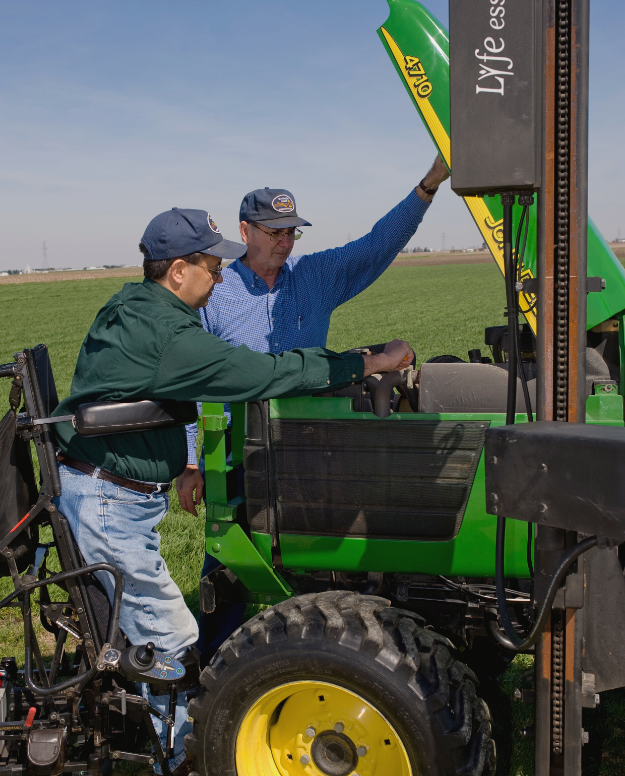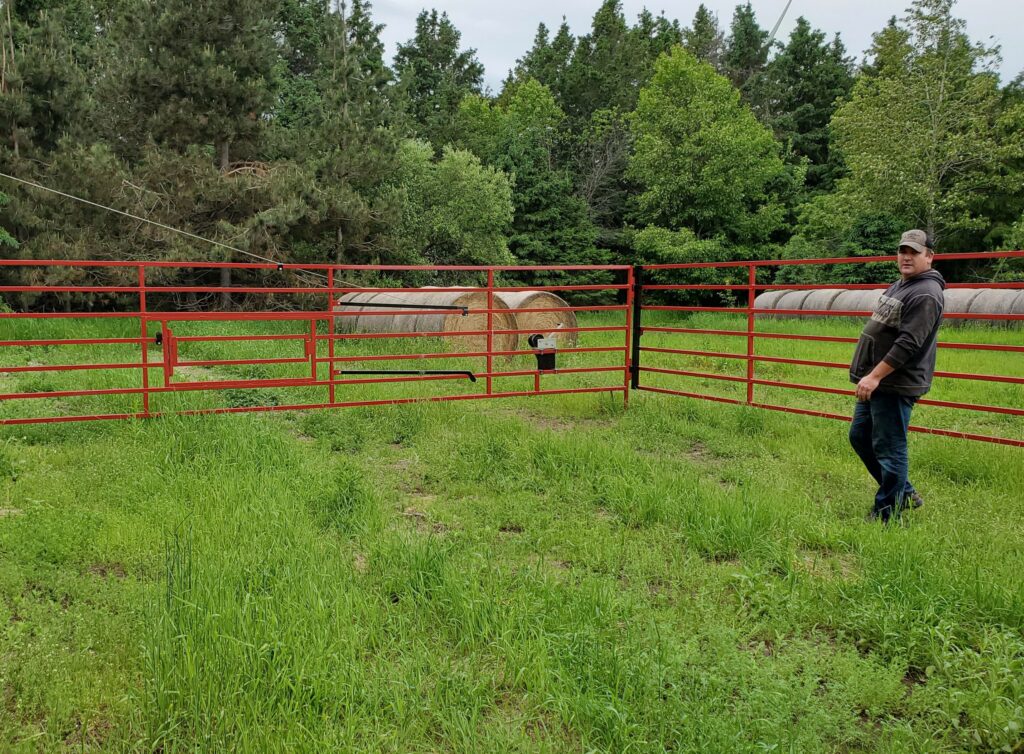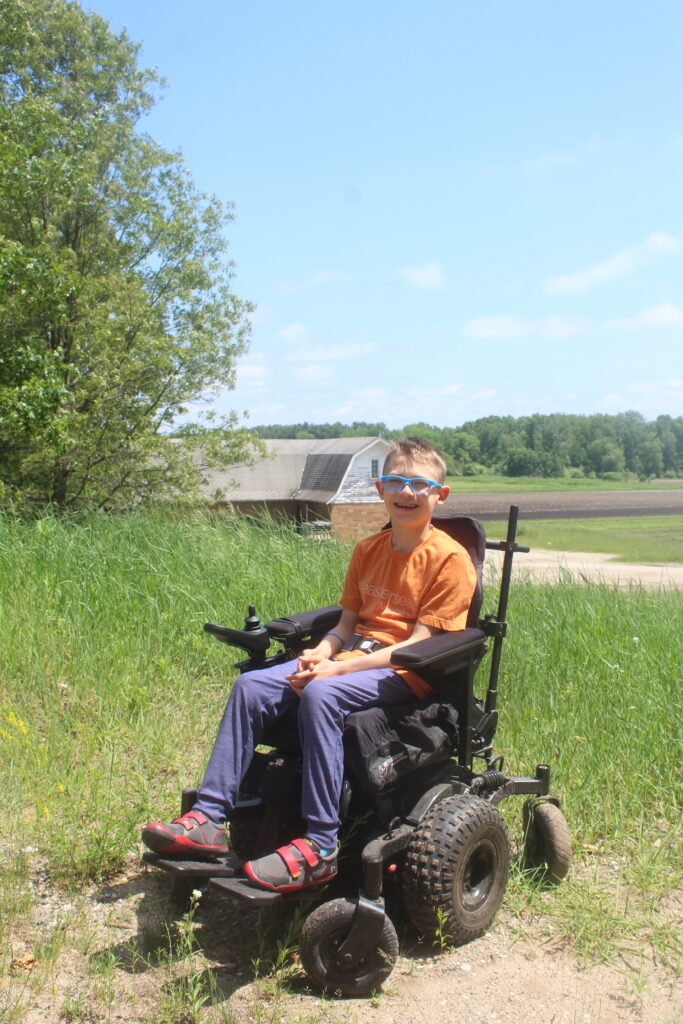Farming Made Accessible with Michigan AgrAbility
by Erin

Getting food from the farm to the table is not always as accessible as it should be. There are many farmers who need support for their disabilities on the job. The average farmer age is 59 and above, and a lifetime of repetitive, physically demanding labor often leads to work-related injuries and disabilities. In 2021, there were 387 work-related farm injuries in Michigan.

Photo credit to Michigan AgrAbility.
Farmers are vital to our food supply, and AgrAbility ensures the people they serve can access their livelihood with adaptive tools, physical therapies, and connecting them to financial and mental health resources, as well as connecting them to farmers in similar situations to provide support and mentorship.
The AgrAbility project is part of a competitive U.S. Department of Agriculture and National Institute of Food and Agriculture (USDA-NIFA) grant program where land grant universities partner with disability nonprofits in 22 states to execute the project. In Michigan, that partnership is between Michigan State University Extension and Easterseals MORC. At the national level, AgrAbility was first funded in the 1990 Farm Bill, shortly after the passage of the Americans with Disabilities Act. In 2023, Michigan AgrAbility supported 215 clients. The individuals they served had a wide range of disabilities, including arthritis, back pain, amputations, paralysis, hearing or vision loss, and chronic fatigue.
Bev Berens, Outreach and Communications Coordinator with Michigan AgrAbility, says: “We help [farmers] by assessing their needs for each situation, and making recommendations for assistive technology [AT] that will help them continue to do their jobs on the farm. Some cases get referred to Michigan Rehabilitation Services for further financial support in getting some AT items that are more costly. Sometimes we are able to provide lesser cost items. Other times, the farmer makes, purchases, or creates what is needed.”
With many connections to Michigan’s agricultural community, Bev understands how farming and farmers are essential to life, as they grow the food that we eat or the food that we feed livestock. She adds, “It is important to keep farmers able to work because it is usually their life’s work, dream, and passion. Being able to work provides purpose and contributes to the family income.”

Kevin Klink on his farm. Photo credit to Michigan AgrAbility.
AgrAbility participant Kevin Klink had a major heart attack at the age of 26, which greatly impacted his stamina and ability to keep up with his cattle farm. Reaching out to AgrAbility wasn’t an easy choice for him because he didn’t want to think of himself as having a disability even as he struggled to keep up with the demanding work.
Ned Stoller, the Agricultural Engineer at Michigan AgrAbility, visited Kevin’s farm and was able to access and offer plans for adaptive technology with the support of Michigan’s Rehabilitation Services, which allowed Kevin to get back to doing his life’s work. This technology included a portable cattle corral, grain bin lid openers, and a mini skid loader for cleaning individual pens and driving through pasture gates. “There is as much an emotional side as a physical side to the equipment that came through this process,” Klink said. “It has eased up things for my family and I don’t have to worry about them or myself falling and getting hurt while we are handling cattle. The OK Corral system is portable, heavy duty, and works great wherever we need to be. I don’t have to worry about a cow crashing over lightweight gates and someone getting hurt.”
Stoller’s technology consults are vital to the success of the Michigan AgrAbility program, and he has worked with other state and regional AgrAbility programs to offer advice, support, and design plans. Bev shares that, while AgrAbility isn’t able to directly provide any assistive technology due to federal restrictions on funding, Ned drafts plans and drawings for different assistive technology solutions and offers them to farmers at no cost. There is also an informal tech bank that families of farmers who have passed donate farming technology back to AgrAbility so they can go to more farmers in need.

Evan using his all-terrain wheelchair. Photo credit from Easterseals MORC.
Michigan AgrAbility supports the farmer’s entire family as well. Evan, age 12, has Cerebral Palsy and likes to help his parents around their corn and pumpkin farm. Before Michigan AgrAbility, he had difficulty navigating the bumpy terrain and long distances with his walker and standard wheelchair. Ned Stoller connected with the family and recommended an all-terrain power chair that would provide better maneuverability. Michigan AgrAbility was able to provide a scholarship to help pay for the chair, giving Evan the independence he needed to thrive. “I want to be a YouTube steamer for my side job,” Evan said. “But my real job will be a businessman and working with my dad.”
Another aspect of Michigan AgrAbility is the importance of their work with Spanish-speaking participants, largely carried out by Andrea Garza, a Certified Occupational Therapy Assistant who works with Michigan AgrAbility through Easterseals MORC. “Range of motion assessments and arthritis screenings are conducted with migrant and Spanish-speaking populations on farms. The assessments are done onsite in Spanish, which is particularly important and helps provide a comfortable and safe atmosphere. Andrea shares ways to reduce fatigue and relax muscles and mitigate pain. Each worker who completes a screening is provided with a gift, such as shoe inserts or knee pads, to help alleviate pain from everyday tasks,” Bev says.
When asked what the most rewarding part of her work is, Bev shares that it’s “helping people continue their work and see and feel the gratitude and joy they have after they have been through the process. It is rewarding to hear how they are using the AT and how it is helping them do their work, reduce frustrations, and improve quality of life.”
To learn more about AgrAbility, visit the Easterseals MORC website. Thank you to Bev Berens, Ned Stoller, Samantha Wolfe, and Heidi Vanderbeek for their interview and guidance with this blog post.






